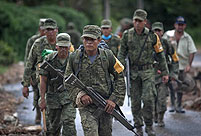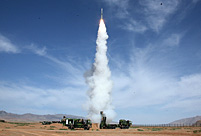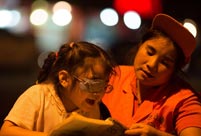Germans started to cast their ballots for a new parliament early Sunday, in an election that will decide who will run Europe's largest economy for the next four years.
About 80,000 polling stations set in schools and other public buildings opened at 8:00 a.m. (0600 GMT), while another 10,000 stations will receive postal voting until 6:00 p.m. (1600 GMT).
Some 61.8 million voters were called to go to ballot boxes, and 34 parties will compete for seats in the Bundestag, lower house of parliament.
Official data show that a total of 4,451 candidates, including 1,149 women, have listed for the election. The youngest candidate was born in 1995, and the oldest in 1923.
For months, parties have been promoting themselves via various campaigns and posters in almost every street of the country.
Since early this month, a giant poster over 1,000 square meters featuring incumbent Chancellor Angela Merkel's symbolic "rhombus" gesture has been standing at Berlin's central railway station, hundreds of meters away from her office. Another orange poster beside read "Germany's future in good hands."
In the election, the ruling coalition consisting of Merkel's conservative Christian Democratic Union (CDU), its Bavarian sister party Christian Social Union (CSU) and the pro-business Free Democratic Party (FDP) faces challenges from another major party, the center-left Social Democrats (SPD) and its preferred partner, the Greens.
Merkel's main rival, SPD chancellor candidate Peer Steinbrueck, cast his ballot at 9:30 a.m. (0730 GMT) in Bonn. "The SPD was able to mobilize voters significantly in the last four weeks. That makes me happy ... I hope that it will be reflected in the results. I feel pretty good. I slept well," said the former finance minister.
In recent polls, the CDU/CSU union was in a leading position, with an approval rate of about 10 percentage points ahead of the SPD, but its partner, the FDP, was wiggling around the 5-percent threshold to enter parliament.
Analysts said a grand coalition of the CDU/CSU union and the SPD as in Merkel's first term would be likely if the FDP failed to win seats in the new Bundestag.
"The election is very important for Germany's future," said a female lawyer, who came to a school ballot station in southeast Berlin where President Joachim Gauck voted at about 9:40 a.m. (0740 GMT). "I think the result will be a grand coalition between the CDU/CSU and the SPD," said the middle-aged, refusing to give her name.
In Sunday's election, each voter could cast two votes -- the first for a constituency candidate to represent his/her constituency in parliament, and the second for a party.@ Half of the 598 parliament seats would be decided by the first votes, while each party's overall seats in parliament would be allocated according to the share of the second votes obtained.
A ruling party or coalition needs a majority of seats in the legislature.
"We hope the party we chose will develop green energy, protect Germany from involving in any war, and make sure that foreigners will be treated fairly here," an elder teacher said after voting together with his wife in central Berlin, where Merkel is scheduled to vote at 1:30 p.m. (1130 GMT).
"The situation here seemed similar to that of last year," said the director of a polling station in north Berlin surnamed Reinhard. During two hours after the station opened, 150 of the some overall 1,500 eligible voters cast their ballots.
An official intermediate result for the voter turnout is scheduled to be announced at around 3:30 p.m. (1330 GMT).
Exit polls results by research institutes are expected to be published shortly after the close of ballot stations at 6:00 p.m. (1600 GMT). An official provisional result is scheduled to be released early Monday.
 Storms leave 97 dead, 58 missing in Mexico
Storms leave 97 dead, 58 missing in Mexico New model of indigenous surface-to-air missiles testfired
New model of indigenous surface-to-air missiles testfired  118.28-carat diamond to be auctioned in HK
118.28-carat diamond to be auctioned in HK Maternal love under streetlight
Maternal love under streetlight Naked foreign student sits in the middle of a road in Haikou
Naked foreign student sits in the middle of a road in Haikou  Colorful Yunnan: Enjoy the natural beauty
Colorful Yunnan: Enjoy the natural beauty Harbin named Chinese city with most beautiful women
Harbin named Chinese city with most beautiful women New college students' military training in Guangzhou
New college students' military training in Guangzhou Rugby girls
Rugby girls PLA's 38th Group Army conduct training
PLA's 38th Group Army conduct training Residences of the royal house of Savoy
Residences of the royal house of Savoy The last days of Wan Aihua
The last days of Wan Aihua Highlights at 12th National Games of China
Highlights at 12th National Games of China Beijing Film Academy welcomes freshmen
Beijing Film Academy welcomes freshmen Large mahjong party sets new world record
Large mahjong party sets new world recordDay|Week|Month